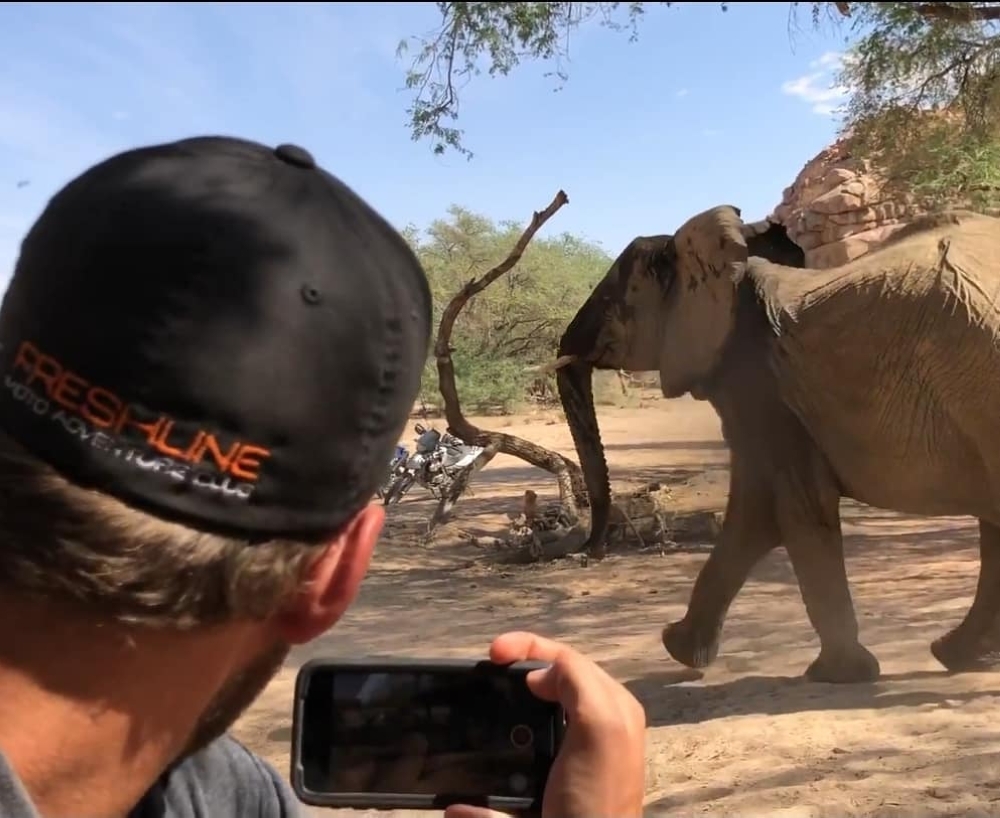Tourists 'extremely disruptive'
Unsupervised motorcycle tours through communal conservation area
An investigation reveals that more than one overseas tour company is being held responsible for alleged rule violations by participants in their motorcycle tours.
A Swiss and an American travel company have drawn unwanted attention to themselves by seemingly flouting several unofficial rules of conduct that are generally taken for granted by nature lovers on their motorcycle tours in northwestern Namibia.Hannibal Tours (from Switzerland) specialises in adventure travel in southern Africa, but also in Central Asia and Mongolia.
One of their enduro adventure tours led to outrage in the electronic media last week, especially on a media portal of the Ministry of Environment, Forestry and Tourism (MEFT).
Video footage from a local guide shows how Hannibal's guests had set up camp near the water hole "Probleem" (named after the former farm).
During a conversation, the operators of Hannibal Tours, Diana Imholz and Carlo Rausa, explained that two motorcycles and one of the support vehicles had flat tyres that needed to be repaired.
“It couldn't be fixed quickly; so we camped for the night on the cement surface of the old farmhouse," said Rausa.
He argued that they stuck to the specified routes "with one vehicle leading and one car following". He added that misbehaving tour participants receive one warning and after a second incident, the motorcycle will be loaded onto one of the trailers. Imholz emphasized that the guests in this particular case were elderly people who "wanted to enjoy nature".
Extreme motorcycle tour
On the website of the American company Freshline Moto Adventures Club (FMAC), extreme motorcycle tours is an option, but applicants must first fill in a long questionnaire to be admitted. "We are on a mission to visit every continent in the world by motorcycle."
According to a ranger from the Save the Rhino Trust (SRT), which also works with the joint initiative of the Uibasen and Twyfelfontein, Sorris Sorris and Doro !Nawas conservation areas of Khorixas in Damaraland, the perpetrators were a group of FMAC motorcyclists.
“They are from the Freshline Motorcycle Club in Nashville, USA. They use (road) maps and make their own routes. "These people drive randomly without following the same track and they generally disturb nature," the ranger said in a voice note
Private property
Tristan Cowley of Ultimate Safaris says: “The conservation area makes an income by taking paying guests on game drives and walking tours. They are careful not to disturb the animals, especially at a watering hole."
Cowley is the driving force behind the local authorities of the three conservation areas mentioned, who have asked the MEFT to lease their areas as a single area, which will create a conservation area of 19 000 hectares.
"Then of course the motorbike tours will be over, because motorbikes have a disruptive effect on this environment and above all, on our rhinos. Once it's private property, we can compel people to follow the existing roads and more importantly, no one can camp at any waterhole,” said Cowley.
Rhinos rehomed
Only when all the video clips were exchanged did it become clear that there were two different motorcycle groups, which were heavily criticized as one group - namely Hannibal Tours. However, Hannibal was never addressed by officials and drove to Omaruru while FMAC was on its way to Twyfelfontein. The two groups had one thing in common: their campsites, which all conservationists said were too close to the waterhole.
According to Andrew Malherbe, SRT's operations manager, these matters have led to stakeholders coming together and now "will look at the motorcycle tours with different eyes".
Existing legislation makes it impossible for the conservation area to act consistently.
"We can talk to people and we can put up signs prohibiting camping, but ultimately we have no legal standing. We are thus helplessly exposed to people who disregard all the rules."
For example, the water hole called "Probleem" is isolated, which is important for the animals and therefore should not be disturbed. "We always had eight to nine rhinos there, as well as elephants and lions, but because of this highly disruptive tourism, the animals stay away."
FMAC had not responded to inquiries by the time of going to press.




